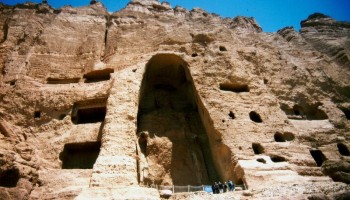In March 2011, investigators in Kyrgyzstan arrested a man in the outskirts of the capital Bishkek. At his apartment they found $20,000 in cash, a diverse spectrum of weapons, and 2.5 kilos of drugs, including one package neatly labeled “To my brother Kamchy.”
“Kamchy,” Eurasianet reported, referred to Kamchybek Kolbayev, a notorious criminal kingpin and thief-in-law.
Kolbayev had been placed on the Kyrgyzstan government’s wanted list one month prior to this arrest. According to the U.S. Treasury Department, he was wanted for crimes related to transnational drug trafficking and the use of weapons and explosives. More recently the department alleged his involvement in human trafficking for forced prostitution and forced labor.
Years before his official designation, Kolbayev was already internationally recognized as one of the most dominant forces in Kyrgyz organized crime. In 2007, the U.S. State Department said that he was "considered to be the leader of the most influential criminal group in [Kyrgyzstan]."
In June 2011, U.S. President Barack Obama identified Kolbayev as a significant foreign narcotics trafficker under the Foreign Narcotics Kingpin Designation Act. The Treasury Department issued additional sanctions in February 2012, freezing all of the U.S. assets Kolbayev may have had and prohibiting U.S. persons from engaging in any transactions with him.
As a top name in Kyrgyz organized crime networks, Kolbayev has wielded powerful political leverage to shroud his illicit activities. In 2005, he mysteriously managed to avoid serving a full prison sentence for murder and arms possession. The exact circumstances of Kolbayev’s release, and Kyrgyz officials’ accounts of it, remain murky, according to Eurasianet.
According to the US State Department, in 2007 the Kyrgyz Prosecutor General's Office ordered the Ministry of Interior to stop searching for Kolbayev.
Kolbayev was officially crowned as a “thief-in-law” in Moscow in 2008, according to the Jamestown Foundation, taking over as the country’s “leading criminal” two years after the position was left vacant with the assassination of Rysbek Akmatbayev. At the time of his death, Akmatbayev had just won a parliamentary election and was under investigation for murder.
Born in Stalinist prison camps, the “thieves-in-law” are a Eurasian crime syndicate linked to illicit activity across the globe, such as money laundering, extortion and bribery. New members are “crowned” after demonstrating an “ideal” criminal background, a 2017 US treasury press release explained. Once initiated, members pledge to live exclusively off their criminal profits and to support other members.
Kolbayev is partly credited with streamlining the so-called “northern route” for smuggling heroin out of Afghanistan via Tajikistan and Uzbekistan. As previously reported by OCCRP, he “took what was an ad hoc, inefficient process, and forged links between some of the major players in return for a cut, making it into a route that can accommodate the more industrial scale loads being shipped out of Afghanistan.”
A 2012 OCCRP report estimated that one quarter to one half of all heroin leaving Afghanistan goes via this route.
Kolbayev was arrested in Dubai in 2011, having been found with stolen jewelry. Despite calls for extradition, he was released by UAE officials for lack of evidence, according to Eurasianet.
In 2014, Kolbayev completed a sentence for extortion in Kyrgyzstan.
Kolbayev appears in a leaked database of property and residency data compiled by assorted real estate professionals, obtained by the non-profit group C4ADS and provided to the Organized Crime and Corruption Reporting Project (OCCRP). He is shown in connection with an apartment in Bahar 1, a high-rise building in the Jumeirah Beach residential complex on the Dubai Marina.
This story is part of the Global Anti-Corruption Consortium, a collaboration started by OCCRP and Transparency International. For more information, click here.






